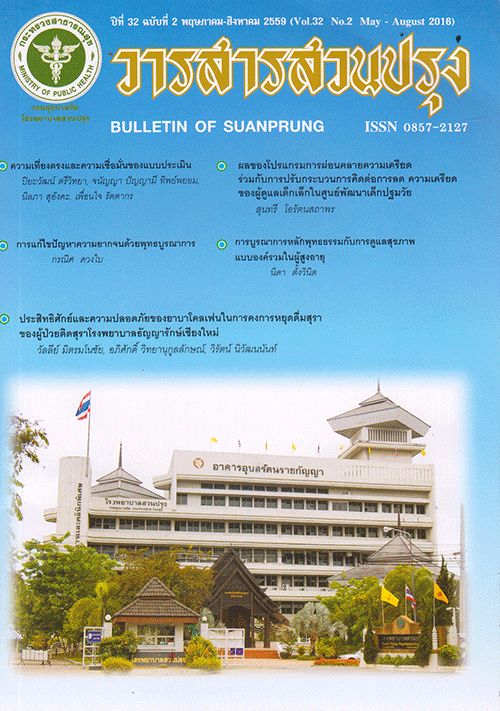ผลของโปรแกรมการผ่อนคลายความเครียดร่วมกับการปรับกระบวนการคิด ต่อการลดความเครียดของผู้ดูแลเด็กเล็กในศูนย์พัฒนาเด็กปฐมวัย (The Effects of a Relaxation and Cognitive Adjustment Program on Stress Reduction of Child-Caretakers at an Early Childhood Development)
Main Article Content
Abstract
วัตถุประสงค์ เปรียบเทียบคะแนนความเครียดของกรณีศึกษาผู้ดูแลเด็กเล็กศูนย์พัฒนาเด็กปฐมวัยก่อนและหลังการเข้าร่วมโปรแกรมการผ่อนคลายความเครียดร่วมกับการปรับกระบวนการคิด
วัสดุและวิธีการ ศึกษารายกรณี คัดเลือกแบบเจาะจง กรณีศึกษาคือพี่เลี้ยงของศูนย์พัฒนาเด็กปฐมวัยจำนวน 3 ราย ที่มีระดับความเครียดสูงกว่าปกติ จากการวัดโดยแบบประเมินและวิเคราะห์ความเครียดด้วยตนเองของกรมสุขภาพจิต ทุกรายได้รับการประเมินความเครียดด้วยตนเองและโดยเครื่องไบโอฟีดแบคก่อน,ระหว่างและหลังโปรแกรมการผ่อนคลายความเครียดร่วมกับการปรับกระบวนการคิดที่สร้างขึ้นตามแนวคิดของลาซารัสและโฟล์คแมน ดำเนินโปรแกรมฯเป็นระยะเวลา 8 สัปดาห์ วิเคราะห์ข้อมูลด้วยการเปรียบเทียบคะแนนความเครียดก่อนและหลังการได้รับโปรแกรมฯเป็นรายบุคคลร่วมกับวิเคราะห์ข้อมูลเชิงคุณภาพ
ผล หลังเข้าร่วมโปรแกรมฯ ระดับคะแนนความเครียดของกรณีศึกษาจากการประเมินด้วยแบบประเมินและวิเคราะห์ความเครียดของกรมสุขภาพจิตลดลง จากระดับความเครียดสูงกว่าปกติเป็นระดับปกติ สอดคล้องกับการประเมินความเครียดด้วยตนเองและโดยเครื่องไบโอฟีดแบคที่พบว่าหลังเข้าร่วมโปรแกรมฯ ค่าคะแนนความเครียดลดลงอยู่ในช่วงผ่อนคลาย ข้อมูลจากการสัมภาษณ์พบว่าหลังการเข้าร่วมโปรแกรมฯ แม้มีสถานการณ์ที่ก่อให้เกิดความเครียดเข้ามาใหม่ แต่กรณีศึกษาสามารถเผชิญความเครียดได้ดี และสามารถผ่อนคลายความเครียดได้อย่างรวดเร็วด้วยตนเอง เนื่องจากกรณีศึกษาได้นำเทคนิคจากโปรแกรมฯคือ การผ่อนคลายหลากหลายวิธีและเทคนิคการปรับกระบวนการคิดให้สมเหตุสมผลมาปรับใช้ทันที
สรุป โปรแกรมฯเป็นกลวิธีหนึ่งที่อาจจะช่วยลดความเครียดของผู้ดูแลเด็กเล็กศูนย์พัฒนาเด็กปฐมวัยได้ เสนอแนะควรมีการนำมาปรับใช้ในกลุ่มตัวอย่างที่ใหญ่ขึ้นและมีการติดตามผลระยะยาว
Objective: To compare the stress scores of three subjects that worked as child-caretakers at an early childhood development center between pre- and post-group participation in the relaxation and cognitive adjustment program.
Materials and methods: This research used a case study approach and was based on purposive sampling technique. The three subjects were three child-caretakers at an early childhood development center that received higher than normal scores on the Self-Analysis Stress Test. All subjects participated in the program once a week for 8 consecutive weeks. The program consisted of 2 relaxation activities and 6 cognitive adjustment activities. The program applied the coping concept of Lazarus and Folkman (1984). Individual comparison of pre-post stress test and qualitative analyses were used in this study.
Results: Post-stress scores from the Self-Analysis Stress Test, the Visual Analog Stress Scale, and from the Skin Conductance (SC) Biofeedback Instrument of all subjects were less than the pre-stress scores. In addition, the contents from interview information revealed that all subjects could cope with new stressful events effectively and they became more relaxed after participating in the program. Moreover, the subjects received a variety of relaxation techniques and cognitive adjustment techniques from participating in the program to adapt to their daily life.
Conclusion: The relaxation and cognitive adjustment program was able to reduce the stress level of the child-caretakers at the early childhood development center. However, adapting this program to the study of a large sample size and long term-follow up are recommended.
Article Details
บทความหลังผ่านการปรับแก้จากกองบรรณาธิการแล้ว เป็นลิขสิทธ์ของวารสารจิตเวชวิทยาสาร โรงพยาบาลสวนปรุง กรมสุขภาพจิต กระทรวงสาธารณสุข ห้ามเผยแพร่เพื่อประโยชน์ทางการค้าโดยไม่ได้รับอนุญาต แต่อนุญาตให้เผยแพร่บทความดังกล่าวเพื่อประโยชน์ทางการศึกษาแก่ประชาชนทั่วไป ทั้งนี้กองบรรณาธิการไม่จำเป็นต้องเห็นด้วยกับบทความหรือข้อคิดเห็นใดๆ ที่ปรากฏในวารสารสวนปรุง

